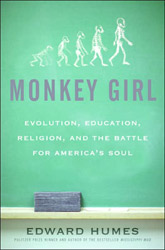 W
WIntelligent design (ID) is a pseudoscientific argument for the existence of God, presented by its proponents as "an evidence-based scientific theory about life's origins". Proponents claim that "certain features of the universe and of living things are best explained by an intelligent cause, not an undirected process such as natural selection." ID is a form of creationism that lacks empirical support and offers no testable or tenable hypotheses, and is therefore not science. The leading proponents of ID are associated with the Discovery Institute, a Christian, politically conservative think tank based in the United States.
 W
WAn intelligent designer, also referred to as an intelligent agent, is the hypothetical willed and self-aware entity that the intelligent design movement argues had some role in the origin and/or development of life. The term "intelligent cause" is also used, implying their teleological supposition of direction and purpose in features of the universe and of living things.
 W
WThe characterization of the universe as finely tuned suggests that the occurrence of life in the Universe is very sensitive to the values of certain fundamental physical constants and that the observed values are, for some reason, improbable. If the values of any of certain free parameters in contemporary physical theories had differed only slightly from those observed, the evolution of the Universe would have proceeded very differently and life as it is understood may not have been possible.
 W
WThis is a list of works addressing the subject or the themes of intelligent design.
 W
WIrreducible complexity (IC) is the argument that certain biological systems cannot have evolved by successive small modifications to pre-existing functional systems through natural selection, because no less complex system would function. Irreducible complexity has become central to the creationist concept of intelligent design, but the scientific community, which regards intelligent design as pseudoscience, rejects the concept of irreducible complexity. Irreducible complexity is one of two main arguments used by intelligent-design proponents, alongside specified complexity.
 W
WThe reaction of Jewish leaders and organizations to intelligent design has been primarily concerned with responding to proposals to include intelligent design in public school curricula as a rival scientific hypothesis to modern evolutionary theory.
 W
WMonkey Girl: Evolution, Education, Religion, and the Battle for America's Soul is a 2007 non fiction book about the Kitzmiller v. Dover Area School District trial of 2005. Author Edward Humes, a Pulitzer Prize-winning American journalist, interviewed interested parties to the controversy around a school board's decision to introduce the concept of intelligent design into public school lessons on science. The book describes in detail the experiences of those caught up in the actions of the school board and the ensuing Dover trial, in the context of the intelligent design movement and the ascendency of the American religious right whose opposition to evolution led them to campaign to redefine science to accept supernatural explanations of natural phenomena.
 W
WOntogenetic depth is a pseudoscientific idea proposed in February 2003 by Paul Nelson, an American philosopher of science, young Earth creationist and intelligent design advocate; he is employed by the Discovery Institute.
 W
WRaëlian beliefs and practices are the concepts and principles of Raëlism, a new religious movement and UFO religion founded in 1974 by Claude Vorilhon, a former French auto racing journalist who changed his name to "Raël". The followers of the International Raëlian Movement believe in an advanced species of extraterrestrial aliens called Elohim who created life on Earth. Raëlians are individualists who believe in sexual self-determination. As advocates of the universal ethic and world peace, they believe the world would be better if geniuses had an exclusive right to govern in what Rael terms Geniocracy. As believers of life in outer space, they hope that human scientists will follow the path of the Elohim by achieving space travel through the cosmos and creating life on other planets. As believers in the resurrection of Jesus Christ through a scientific cloning process by the Elohim, they encourage scientific research to extend life through cloning, however critics outside are doubtful of its possibility.
 W
WThe relationship between intelligent design and science has been a contentious one. Intelligent design (ID) is presented by its proponents as science and claims to offer an alternative to evolution. The Discovery Institute, a politically conservative think tank and the leading proponent of intelligent design, launched a campaign entitled "Teach the Controversy" which claims that a controversy exists within the scientific community over evolution. The scientific community, however, rejects intelligent design as a form of creationism. The basic facts of evolution are not a matter of controversy in science.
 W
WSpecified complexity is a creationist argument introduced by William Dembski, used by advocates to promote intelligent design. According to Dembski, the concept can formalize a property that singles out patterns that are both specified and complex, where in Dembski's terminology, a specified pattern is one that admits short descriptions, whereas a complex pattern is one that is unlikely to occur by chance. Proponents of intelligent design use specified complexity as one of their two main arguments, alongside irreducible complexity.
 W
WTheistic science, also referred to as theistic realism, is the pseudoscientific proposal that the central scientific method of requiring testability, known as methodological naturalism, should be replaced by a philosophy of science that allows occasional supernatural explanations which are inherently untestable. Proponents propose supernatural explanations for topics raised by their theology, in particular evolution.
 W
WThis timeline of intelligent design outlines the major events in the development of intelligent design as presented and promoted by the intelligent design movement.
 W
WA universal probability bound is a probabilistic threshold whose existence is asserted by William A. Dembski and is used by him in his works promoting intelligent design. It is defined asA degree of improbability below which a specified event of that probability cannot reasonably be attributed to chance regardless of whatever probabilitistic resources from the known universe are factored in.
 W
WThe watchmaker analogy or watchmaker argument is a teleological argument which states, by way of an analogy, that a design implies a designer, especially intelligent design an intelligent designer, i.e. a creator deity. The analogy has played a prominent role in natural theology and the "argument from design," where it was used to support arguments for the existence of God and for the intelligent design of the universe, in both Christianity and Deism.